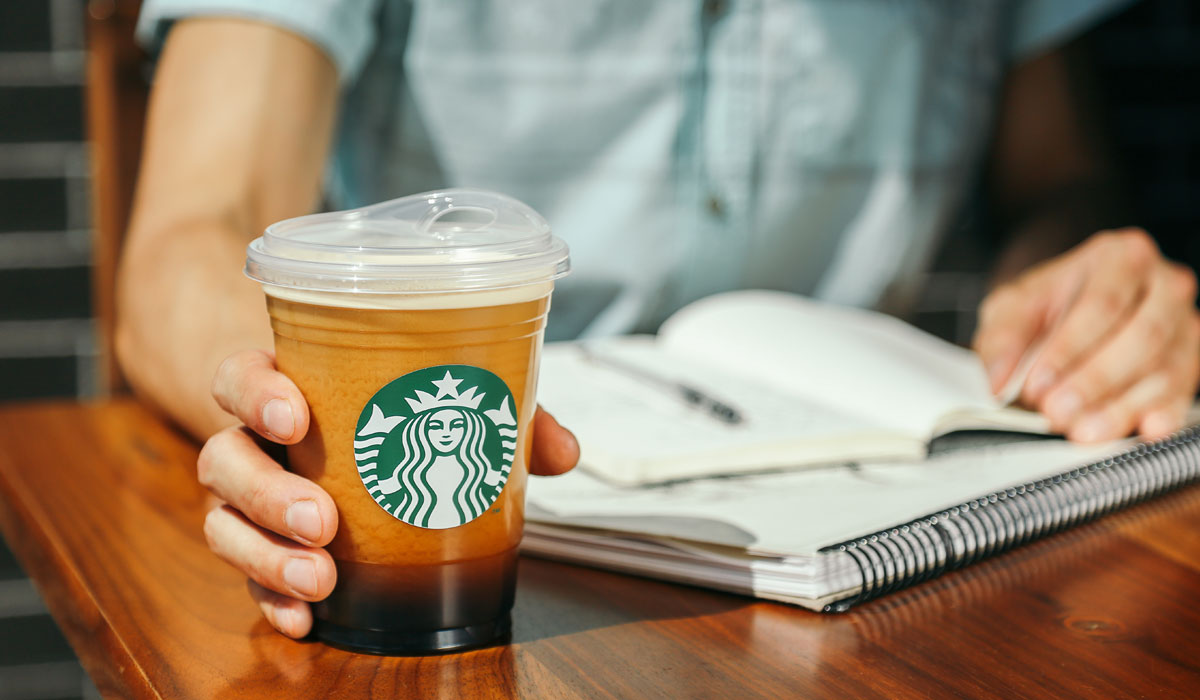Given the mounting pressure around eliminating plastic straws, with Seattle even becoming the first U.S. city to ban them July 1, Starbucks recognized it was time to act. The chain announced Monday it plans to phase out plastic straws from its more than 28,000 restaurants worldwide by 2020—a move that would eliminate more than 1 billion straws per year from the marketplace.
Starbucks said it is replacing the straws with a lid designed by Emily Alexander, who created the product as an engineer in Global Research & Development at Starbucks. After 10 years of experimenting, Alexander, who is now a senior sourcing analyst in Starbucks’ global sourcing department, developed a strawless lid that features a teardrop-shaped opening about the size of a thumbprint.
READ MORE: Starbucks CEO on why the chain’s recent performance needs to improve.
The lids debuted in a single store and have expanded to a small number of drinks, including Draft Nitro and Cold Foam in more than 8,000 units in the U.S. and Canada. They will now become the standard for all iced drinks except Frappuccinos, which will be served with a straw made from paper or PLA compostable plastic manufactured from fermented plant starch or other sustainable material. Starbucks added that any customer who prefers or needs a straw could request one made of alternative materials for use with any cold drink.
Starbucks’ cold beverage sales are a rapidly growing segment of its mix. Five years ago, cold beverages comprised 37 percent of sales. By 2017, the figure hiked to more than 50 percent.
[image source_ID=”108011″]
“For our partners and customers, this is a significant milestone to achieve our global aspiration of sustainable coffee, served to our customers in more sustainable ways,” said Kevin Johnson, president and chief executive officer of Starbucks, in a statement.
Starbucks started testing these straws “made from materials other than traditional plastic,” last year in Santa Cruz, California. The company is piloting paper straws currently in the U.K.
“I am really excited to have developed something that can be part of this big transformation of going strawless,” Alexander added. “It was this very small thing and now it is so much bigger and more impactful.”
The new lids will first hit Seattle and Vancouver, British Columbia, with additional stores coming onboard periodically through 2020. The lid is made of plastic, but its polypropylene content can be widely recycled, Starbucks said.
“By nature, the straw isn’t recyclable and the lid is, so we feel this decision is more sustainable and more socially responsible,” Chris Milne, director of packaging sourcing for Starbucks, said in a release. “Starbucks is finally drawing a line in the sand and creating a mold for other large brands to follow. We are raising the water line for what’s acceptable and inspiring our peers to follow suit.”
Colleen Chapman, vice president of Starbucks global social impact overseeing sustainability, added that Starbucks’ decision to eliminate straws was a response to requests from investors, employees, and customers.
“This move is an answer to our own partners about what we can do to reduce the need for straws,” she said. “Not using a straw is the best thing we can do for the environment.”
The company has some additional initiatives around sustainability. The company invested $10 million in the NexGen Cup Challenge to develop a fully recyclable and compostable hot cup. In 2014, Starbucks also started selling a $1 reusable cup in the U.S., with Canada and the U.K. following. Starbucks said more than 18 million have been sold.
Starbucks is trying out a 5p paper cup charge in London and said it expects to expand the test to 950 U.K. restaurants later in July.
The company said in June it is expecting 1 percent same-store sales growth globally in Q3, which would mark its lowest comps growth in nine years. It also expects to close underperforming company-operated restaurants in its mostly densely penetrated markets to about 150 restaurants in 2019, up from a historical average of up to 50 annually. Starbucks opened 468 net new stores in Q2 to bring the total to 28,209 stores across 76 markets.
The move away from plastic straws has affected brands throughout the restaurant industry. McDonald’s started phasing out plastic straws in about 1,300 U.K. and Ireland restaurants in June. The company features compostable straws in certain U.S. markets, like Seattle, where fines of up to $250 can hit restaurants who don’t comply, and is working on a worldwide solution.

